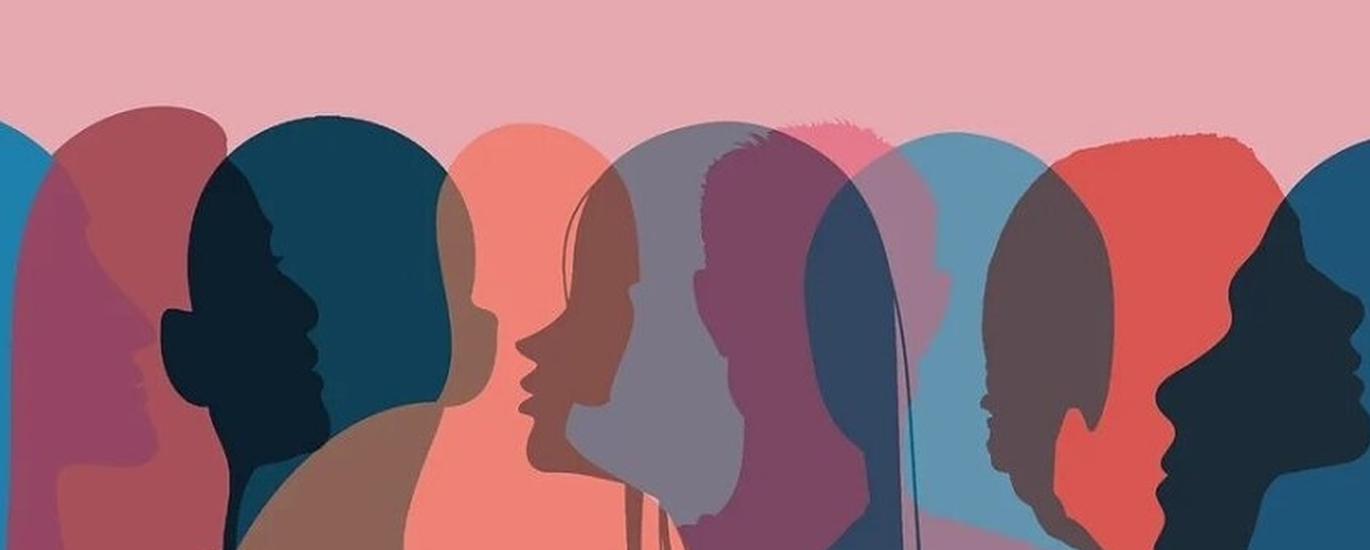“this system that we call patriarchy is thousands of years old, but it’s only a few days deep”
Amy is joined by Rev. Cynthia Brix, Dr. William Keepin, and Harin Jeong to discuss their groundbreaking work with Gender Equity and Reconciliation International.
Our Guests
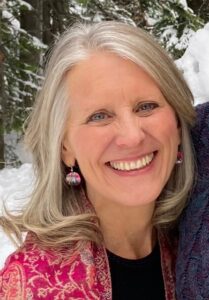
Rev. Cynthia Brix
Rev. Cynthia Brix, is co-founder of Gender Equity and Reconciliation International, which has organized 280 intensive trainings in twelve countries for healing and reconciliation between women and men, and people of all genders. She is an ordained interfaith minister and Co-Director of Satyana Institute. She was formerly a campus minister at the University of Colorado for United Ministries of Higher Education. Cynthia co-chaired the Race Relations Committee for the City of Muncie, Indiana, and served in numerous leadership positions for Planned Parenthood in Dallas and in Indiana. A long-time student of Eknath Easwaran’s Passage Meditation, Cynthia leads retreats on interfaith spirituality. She co-organized five international conferences on interspirituality, one of which brought women spiritual masters together from Buddhist, Christian, and Hindu traditions, and she produced a DVD video from this conference entitled Cultivating Women’s Spiritual Mastery. Cynthia holds an M.Div. from Iliff School of Theology (2006), a double M.A. in wellness management and applied gerontology, and an honorary doctorate from the California Institute of Integral Studies. She is contributing author of Divine Duality: The Power of Reconciliation between Women and Men (Hohm Press, 2007), and co-author of Women Healing Women: A Model of Hope for Oppressed Women Everywhere (Hohm Press, 2009).
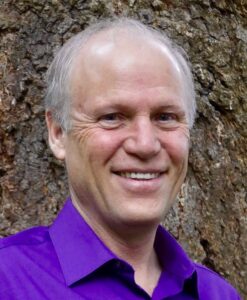
Dr. William Keepin
William Keepin, PhD, is co-founder of the Gender Equity and Reconciliation International project. A mathematical physicist widely published in the fields of sustainable energy, global warming, archetypal cosmology, comparative mysticism, and the intersection of science and spirituality, Will has presented testimony to European and Australian parliaments, and the US House of Representatives. He became a whistleblower in nuclear science policy, recounted in The Cultural Creatives (Paul Ray and Sherry Anderson, Harmony Books, 2000). Will co-founded the Satyana Institute, and together with Rev. Cynthia Brix organized five international conferences to facilitate dialogue, interspiritual practice, and collaboration across the major religions and science. Will trained extensively in spiritual traditions East and West, and holds a Ph.D. in applied mathematics, M.S. in mathematical physics, M.A. in East-West psychology, and honorary doctorate from the California Institute of Integral Studies. He is a Fellow of the Findhorn Foundation, and has facilitated Grof holotropic breathwork since 1989. Will is author of Divine Duality: The Power of Reconciliation Between Women and Men (Hohm Press, 2007), and Belonging to God: Spirituality, Science, and a Universal Path of Divine Love (SkyLight Paths, Turner Publishing, 2016). He is co-author of Women Healing Women (Hohm Press, 2009); and Song of the Earth: The Emerging Synthesis of Spiritual and Scientific Worldviews (Permanent Publications, London, UK, 2012).
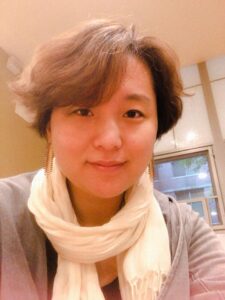
Harin Jeong
Harin Jeong, MA is a GERI facilitator and lead coordinator for GERI in South Korea based in Seoul. And I’ll just make a note that the full title of this organization is Gender Equity and Reconciliation Institute, but we’ll abbreviate that sometimes by just saying GERI. So listeners, when you hear the word GERI, you’ll know that that’s what we’re talking about. She is the CEO of the Center for Courage and Renewal Psychology Counseling and is a counselor focusing on sexual and gender-based violence survivors and supporting LGBTQIA+ clients. She has experience in organizational development and is a certified sociocracy coach, and she is a consultant on issues of gender equality and conflict management.
The Discussion
Amy Allebest: Welcome to Breaking Down Patriarchy, I’m Amy McPhie Allebest. Today I’m going to start by reading the first paragraph of the book we’ll be discussing today, which is called Gender Equity & Reconciliation: Thirty Years of Healing the Most Ancient Wound in the Human Family. It says: “We are one human family. Could anything be more obvious? We are brothers and sisters and non-binary siblings of the one human family. No matter how much we dwell on our differences, which are important, we are ultimately far more alike than different. We are similar siblings who have fashioned a fractured world of disastrous divisions. We have divided our family in many tragic ways, and one of the most ancient and destructive is along gender lines. The entire human family suffers from the devastation of gender oppression and injustice regardless of race, culture, nationality, or religion. It’s been going on for thousands of years in every country and continent, in families and institutions alike, across all social strata, from leaders to laborers, from wealthiest to poorest, from our intimate bedrooms to corporate boardrooms, and everything in between. Humanity is deeply divided under a kind of gender apartheid of our own making. The time has come for this tyranny to end once and for all.”
I believe this and feel this with all my heart. This podcast is called Breaking Down Patriarchy precisely for the reasons listed in this paragraph. My goal has been to understand how patriarchy functions to break it down for listeners so that more people can understand it and can’t be gaslit and into believing that everything is fine and the pain they feel isn’t real. Also, I want to break down patriarchy as in dismantle it. But I found that that second part, dismantling it in our minds and hearts and relationships and institutions, can be really hard because often people don’t even know where to start.
So, I am really excited to welcome to the program some experts who not only understand the problem of this ancient wound, but who have actually developed a system of healing it. Their names are Will Keepin, Cynthia Brix, and Harin Jeong. Welcome, Will, Cynthia, and Harin! I’m so happy to have you with us today.
Cynthia Brix: It’s great to be here. Thank you, Amy, for having us.
Will Keepin: A great joy, Amy, to be on this podcast and I love the title. It’s such an important focus.
AA: It’s pretty direct, right?
Harin Jeong: Hello everyone! Good to see you, Amy, and thank you for having me.
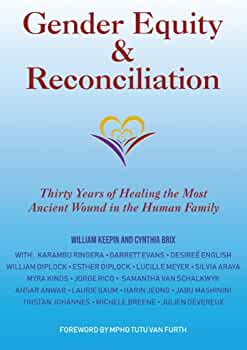
AA: Thanks again for being here. Will and Cynthia are authors of the book I quoted above, which again is called Gender Equity & Reconciliation: Thirty Years of Healing the Most Ancient Wound in the Human Family. And Harin is one of the contributors to the book. So, let’s start out by getting to know each of you a little bit, and maybe the way we can organize it is that I will read your professional biography one at a time, and then when I’m done with your professional bio then you can tell a little bit about who you are on a personal level. Like where you’re from and your origins and what has brought you to the work that you do today.
I’ll start with Cynthia. Reverend Cynthia Brix, PhD is the co-founder of Gender Equity and Reconciliation International. An ordained interfaith minister with a background in women’s issues and racial diversity, she co-organized seven international conferences on inter-spirituality, including two on women’s spiritual leadership across diverse religions and indigenous traditions. Cynthia holds an honorary doctorate from the California Institute of Integral Studies, an MA in Wellness and Gerontology, a Master’s of Divinity, and is certified in Grof Breathwork. She is an evolutionary leader and co-author of Divine Duality. And I think that’s a book, right Cynthia?
CB: That is a book, yeah.
AA: Wonderful! Well, will you introduce us to you on a little bit more of a personal level?
CB: So, I live in Seattle, Washington in the United States, and also in British Columbia in the Okanagan Valley. And I have two children who are young adults. Patrick, who’s 39, and Emily who’s 33, and a granddaughter who’s four years old. So those are very important aspects of my life and identify me and my gender in some ways, and my sexuality and my love and my light in the world, and one part of what I’ve brought forward in this world. I came to this work, what, 23 years ago. But my mother introduced me to the work. She came about five years earlier to a workshop, and when she came home, she said to myself and my brother and my sister-in-law, “I want to gift you by sending you to a workshop. And for everything I messed up in your life, this work will heal you.” Hahaha. And so, I had a really cool mom. My mom died like 12 years ago, unfortunately, at the age of 72. But she knew what needed to be done.
And it took me five years to get to my first workshop. But once I did, I went through a significant transformational experience in that workshop. And then one month after that, I was working in the health and wellness field, and I had just started a job probably about five months earlier. And a month after my workshop, the chairman of the board, the founder of this corporate organization and someone I had studied about in my graduate work, he’s world renowned in health and wellness, he sexually propositioned me. He said, “Cynthia, I’ve enjoyed getting to know you, and now it’s time to take our relationship to a deeper, more intimate sexual level.” I said, no, he didn’t hear my no. I was in my thirties. No, I was 40, I guess. And he wouldn’t listen. He wouldn’t stop. And he kept pressuring me throughout the week, I finally decided to bring it forward and I was getting pushed in a corner really. And I tried to do it with as much compassion as I could. He actually said he was sorry, but the corporation hired six attorneys to push me out of that job.
And when they successfully pushed me out I didn’t trust men. I didn’t wanna be around men. I didn’t know how to be in my body. But I also didn’t trust women because the women in the corporation betrayed me too. They had to, to stay in the system, keep their jobs. And so, it took a lot of healing, therapy many times a week, just diving into my interior environment to figure this out. And I will say through the gender equity and reconciliation and international work, which I was then involved with at that point, I came to a place of deeper understanding of what was happening. And I turned betrayal and anger into compassion, deeper understanding, and ultimately agape love, if you will. So I’ll just end there. I think this is the most important work any of us can be doing, along with all the work of intersectionality around race, culture, ability, religion, all of this is so important. But gender, for me, I believe is at the core of our issues going on right now. So, thank you, Amy.
AA: Thank you, Cynthia. That was such an inspiring story. I have to admit that when you said that they hired six lawyers, I thought it was to get that guy out of there, and then when you said it was to get you out of there, I gasped! Oh, I should have known that was coming. I shouldn’t be so naïve, but that was shocking and awful. But what beauty you’ve managed to create from that pain and that unfortunate experience.
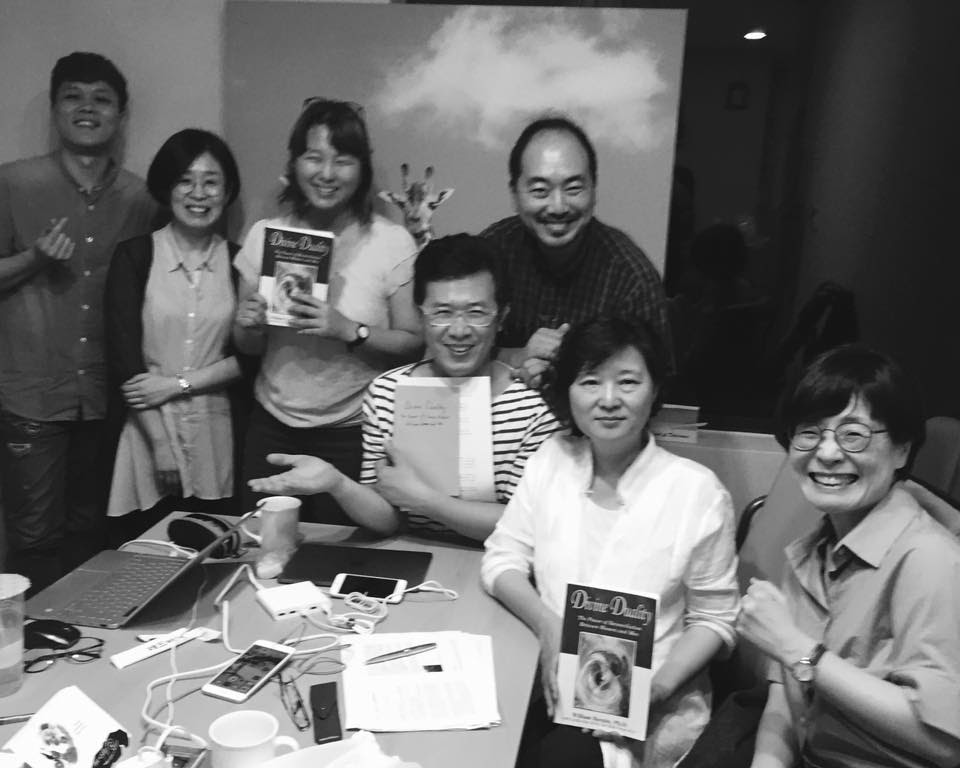
CB: Yeah. It was, and I’ll just say one more thing and that is, I knew that if I went to the federal court, which it would’ve taken, it would turn into a cancer in my body. And I did not need to do that. I didn’t need to take my children and my family through that, I was a single mother at that point. I could have fought it, but it wasn’t worth that fight. And I knew that deepening into the work I’m doing now with Will and Harin and our whole global community was where I really needed to put my energy. So I transformed it in this way to bring it into the work.
AA: Wonderful. Well, thank you so much. Okay, Harin, I’ll read your professional bio and then have you tell a bit of your story as well. Harin Jeong, MA is a GERI facilitator and lead coordinator for GERI in South Korea based in Seoul. And I’ll just make a note that the full title of this organization is Gender Equity and Reconciliation Institute, but we’ll abbreviate that sometimes by just saying GERI. So listeners, when you hear the word GERI, you’ll know that that’s what we’re talking about. She is the CEO of the Center for Courage and Renewal Psychology Counseling and is a counselor focusing on sexual and gender-based violence survivors and supporting LGBTQIA+ clients. She has experience in organizational development and is a certified sociocracy coach. And she is a consultant on issues of gender equality and conflict management. So welcome, Harin, thanks so much for being here. And if you can tell us a little bit about yourself, about where you’re from and what has brought you to this work.
HJ: Thank you, Amy. As you say, I am a licensed therapist in South Korea. I usually meet teenagers and women and LGBTQ+ people as a feminist counselor. I’m 47 years old, and I also have two sons who are 20 and 18 years old. I was the eldest daughter of a quite conservative Christian family. My dad was a pastor in church. My grandfather had two wives and two sons. My father was a special son to my grandmother as he filled in the love of my grandfather for her. Her affection toward my dad led to a strange and uncomfortable tension between her and my mother every day. You can admit that the first daughters in Korea have a lot of duties to make peace or make our families smile. Even after I was born, my grandmother didn’t seem to respect my mother because in Korea the boy is the best, better than the girl. Anyway, she bullied my mother and my father had to struggle between the two women. In the end, none of them were happy. That’s my story.
AA: Thank you so much for sharing that, Harin.
HJ: You’re welcome.
AA: I’d love to ask you more questions later when we get into the GERI work and you can talk about the work that you’re doing in Korea. Thank you so much. All right. So, Will Keepin, I’ll again read your professional bio and then we’d love to hear a little bit more about you. William Keepin, PhD is co-founder of Gender Equity and Reconciliation International and the Satyana Institute. A mathematical physicist with training in contemplative spirituality and transpersonal psychology, his research on global warming and sustainable energy influenced international environmental policy. He has published widely on environmental science, quantum physics, ecology, archetypal cosmology, comparative mysticism, divine feminine theology, and principles of social change leadership. He is an evolutionary leader and a Findhorn Foundation fellow. So, welcome Will. And again, if you can tell us a little bit about you, where you come from and what brought you to this work.
…all the work of intersectionality around race, culture, ability, religion, all of this is so important. But gender, for me, I believe is at the core of our issues…
WK: Well, thank you Amy. And what brought me to this work is the same thing that caused you to found this podcast. So I really want to honor this podcast because I have a deep conviction that patriarchy is the single– we have many problems, but it is probably the single deepest root of the main afflictions of the human family. And so I just want to say how honored I am and just how validating it is that you have this podcast that’s really looking at this from all these different angles. I want to begin, and this is not where I normally begin, but I want to begin because of the theme of this podcast with a very remarkable quotation from of all people, Steve Bannon, with whom I pretty much disagree with everything he said, but there’s one thing I agree with. He said “the anti-patriarchy movement is going to undo 10,000 years of recorded history.” Now, he put that forward as a caution and a warning that he lamented and I put it forward as a celebration, but also as a deep insight. He is not mistaken about that. That is the depth of this work of breaking down patriarchy. It will transform 10,000 years of oppressive structures of injustice in the human family. And that is why I am committed to this work and why we do what we do. And so I want to start there because I really appreciate this podcast and what you’re doing here.
And my own experience comes from my childhood. I began to experience those injustices in my own family with certain forms of abuse that happened to me as a child. And then also, it wasn’t until I was in my college years, but in my early college years I had to take a course in social problems. And one of them addressed the whole issue of feminism, which I was completely clueless about. And yet, when I took that course, I began to realize, oh my god, how true that was in my own family. I have three sisters, two brothers, and seeing how the sisters were treated differently, seeing how the brothers were lifted up in ways that were not consciously intentional, but were transmitted. And I began to become aware of the magnitude of the gender imbalance, and I hadn’t been aware of it. And I thought of myself as a pretty conscious and aware guy, and I was blown away by how blind I had been to this very systemic and obvious imbalance.
So that was the beginning of my awakening. And then when I became of age, I became a scientist. I moved into the area of climate change mitigation, worked in that area for about 25 years, really working to basically mitigate global warming through sustainable energy and renewable energy technologies. And in the context of that work in the ‘80s and early ‘90s, there was quite a bit of basically #MeToo violation going on within our mainstream professional networks. And so a group of us began to address the issues. As a side note, I had also been doing an intensive training with psychiatrist Stanislav Grof, and his whole practice of holotropic breathwork. And through that I had been invited by two psychotherapists who were in a same-sex relationship, two lesbians, who had a clientele, probably 80% of whom had experienced some form of sexual violation. And I worked with them closely for six years applying the breathwork in that context and was really awakened to the magnitude of incredible suffering and shattering of those kinds of experiences that have affected so many people. So that was a very important background for the work that we started in the mainstream environmental movement. And that sensitized me to the kind of symptoms of oppression and abuse that were basically under the radar, but quite significant. There was quite a bit of suffering, and of course it was taboo to talk about what was going on so there were whisperings.
And so a group of us 31 years ago created some forums and workshops to address this. And we were just professional colleagues so we could be quite experimental. And the first couple that we did really were very powerful and created a forum for truth to be spoken where that forum didn’t exist. And it kind of blew the lid off. It was very powerful and unleashed an intensity that was, you know, kind of scary and frightening. And that led some of the facilitators to say, well, we got to stop. We have to put a lid back on this Pandora’s box because we have an earth to save. That’s what we’re all about. And then others of us said, well actually, this has a whole lot to do with what it is going to take. Because we have this contradiction between trying to heal our relationship with the natural environment while our human ecology has got this toxic issue that is taboo and can’t even be addressed. So that’s how it got started.
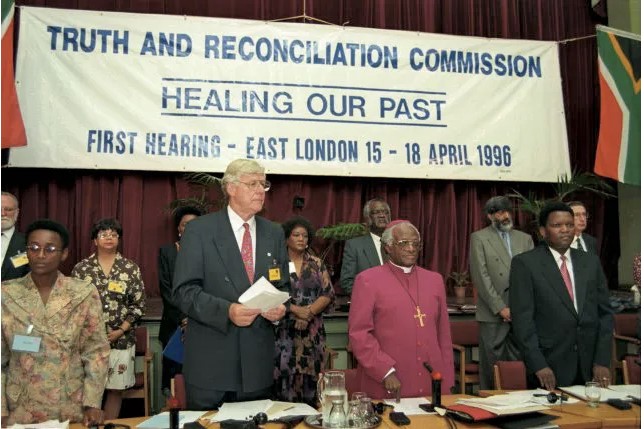
And in the first few years it was very experimental. We quickly found out that just talking through the issues was not enough. We needed to bring in experiential modalities that had more transformative and somatic impact. So we worked with psychodrama and breath work and counsel process, and a variety of different practices to really address these issues in mixed groups. And after about four or five years we began to get some quite good results and that was when the work began to grow. We also, at that time, were very inspired by what was happening in South Africa with the Truth and Reconciliation Commission. And very inspired by Desmond Tutu and that whole process, and we realized we need that same process for gender. We need the same kind of depth of healing and truth telling that’s happening there around racism, we need gender reconciliation also. So that’s when we renamed the work Gender Reconciliation, and then later Gender Equity and Reconciliation.
And then from there, what happened was we began to get invitations beyond and outside of our activist movement. And that was how the work began to grow and kind of took over my life. Because initially it was, you know, a side part of my main day job. And over time it transferred to become my main day job. And as these invitations came in, particularly from therapists, from academics, from clergy, we began implementing this work more widely, and so it was a slow and steady growth. In 2001 we got invited to India, in 2003 we got invited to South Africa. So it began to expand like that, and it’s been an incredibly inspiring and rich project that has now transformed into a training organization. We’re training facilitators and the next generation of leaders in this work, and the reason we call it international at the end of GERI, Gender Equity and Reconciliation International is because we’re really seeking to create a global movement to transform the patriarchy. Because what we’ve learned, to put it in one sentence, we’ve learned that this system that we call patriarchy is thousands of years old, but it’s only a few days deep. That if you can create the forums of deep truth telling, then what happens is the shackles begin to crumble of this system that oppresses everyone. And because patriarchy cannot withstand the twin forces of truth and love. And it does crumble. So our deep conviction is that we can and that we are transforming this, and that everyone benefits from dismantling a catastrophic system of injustice that oppresses everyone.
AA: Wow. Thank you so much. Well, thank you for those kind words at the beginning. It’s a mutual honor to have you here, and thank you for those words about the podcast. And thank you for everything you just shared. This is really the perfect bridge to dive into the work that GERI does. So thank you for explaining the genesis of the work. I was going to ask you just a couple more questions about the who, what, when, where, and how it works. I’ve read the book, am I right in thinking that the book came out quite recently?
CB: Yeah, it came out in October, 2022.
AA: Okay, fabulous. So the book describes these workshops that you were just talking about. It talks about the principles that underpin, you know, the principles that diagnose the problem, and then here’s what we can do to heal and here’s how the workshops work. What I’m wondering as I’m thinking about my own community, about where I live right now, is what would that look like if there were a GERI workshop in my community? Could you describe how many people would be there, how do you find them, and then what actually happens during a workshop?
CB: So we work with, as Will just described, we work with organizations, individuals, universities, religious organizations, anyone. I mean, as we say in the book, it’s from the bedroom to the boardroom. So anyone is welcome. And we’ve worked with groups, typically a workshop group in person is 20 to 30 people. However we have had events and workshops that are 75 or 150. We just adapt, and the main thing is that everyone’s there and there’s always just an invitation to share your story. So a lot of it is sharing the truth of our experience, of what it is to live in this body, in our particular gender. We like to honor and bring the wisdom of the Reverend Dr. Martin Luther King forward, when he said “Injustice and corruption will never be transformed by keeping them hidden, but only by bringing them out into the light and confronting them with the power of love.” And that’s really the work of GERI.
We convene safe circles, as safe as possible, and we invite the taboo and sensitive stories and issues around gender and sexuality to be brought forward and shared. And we do it without shame or blame. And it’s not a cancel kind of thing. It’s really about leaning in together and sharing with as much compassion and as much deep understanding as possible. It doesn’t mean we don’t go into really challenging territory to listen to those things, but we hold each other through them. And sometimes there’s some tension or conflict, but we also work with that through different practices, breath and trauma release practices, this sort of thing. Holotropic breathwork, as Will said. So we introduce these things so that we are not re-traumatized or re-stimulated in our trauma, but rather that we stay regulated and we can sit together and share deeply about it.
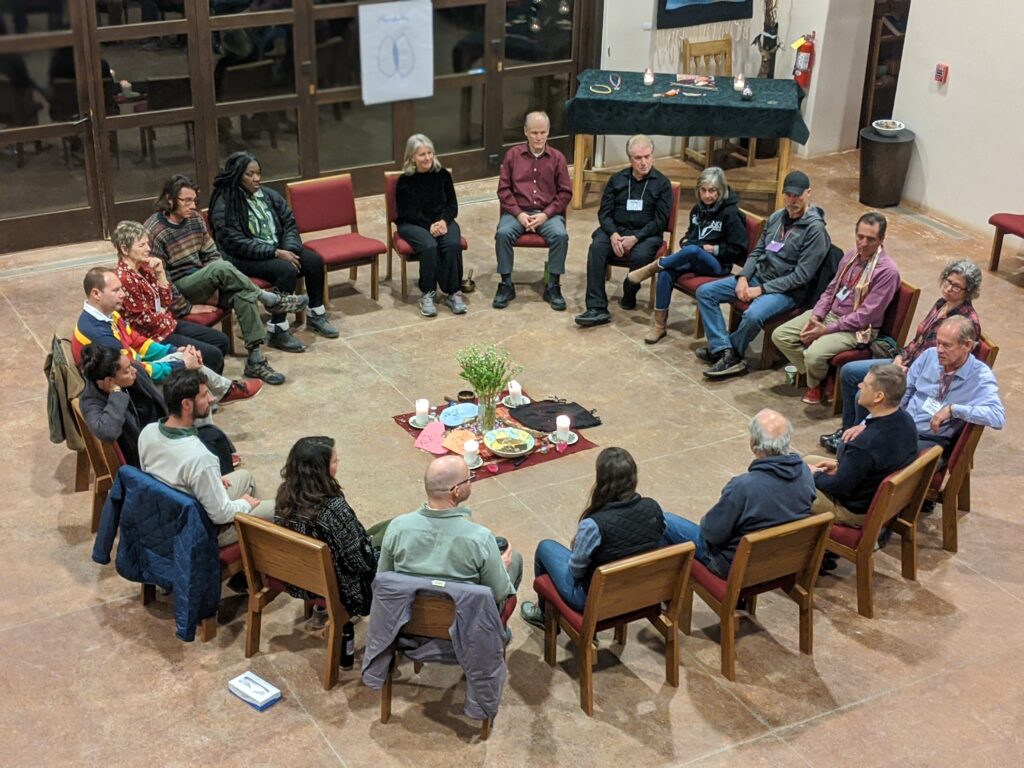
So the introductory workshop is three days long. And we come in and the first day is really to get to know each other, to create as safe a space as possible through community agreements and through beginning to share our story. And none of us here, the three of us, nor any of our facilitators or trainers claim to be experts in gender. We’re very well versed in our model that we have in the workshop form. But we all have our own story, and what we do say is that every one of us has the wisdom and the expertise in our own gender story, and we bring it forward in our programs and we do so in the way of different activities that get us talking. So sometimes that’s in small groups, pairs. If we’re doing our MeToo to WeTogether program then we separate into men’s and women’s groups. And if we’re doing the LGBTQ program, then it’s more open and fluid and working in circles together, we might break into separate groups but it’s not based in the binary as much. And then we also have a BIPOC (Black, Indigenous, people of color) program.
And all of these different programs are so that we can do the deeper work that we need to. Because, you know, Black and brown people, indigenous people don’t need the white gaze. They need a safe space to speak their story without having white people in the room, basically. The same can be true of LGBTQ people. Everyone’s invited to the MeToo to WeTogether program, even though we do move into separate men’s and women’s groups. So it’s really finding where you’re most comfortable there. And I’ll just complete by saying the really essential part of our GERI work is that we go deeply into sharing and witnessing one another in the truth of our story, which as I said, can be really challenging terrain sometimes because issues of domestic violence come up, issues of pornography come up. What else? Sexual violence, bullying, marital issues all across the board. Not feeling safe walking down the street alone because you’re a woman or because you’re gay or trans or whatever it is. All of these things come up and yet we do the work there, but we don’t stay there. We know that we need to come out.
And we’ve begun the hard work of healing and starting to transform thousands of years of oppression and then we honor each other. And so this is an essential part of our work too, that we consecrate the work we’ve done and we honor each other for going into that territory that’s difficult. And so in the MeToo to WeTogether program, the women create an honoring ceremony for the men and the men create an honoring ceremony for the women. It’s quite beautiful and a really important piece of the work. In the LGBTQ program, there’s a creation of a ceremony of honoring one another for showing up in the work.
AA: Thank you, Cynthia. This really makes me want to just book you for right now. Can you come to my–
CB: Yes, yes, we can!
AA: My community, my religion of origin, my state. I mean, this is just such inspiring work. I’m so thrilled to hear, I was thrilled to read about it in the book, but hearing you describe it I’m getting even a more complete sense of how it works. And I’m just so happy to hear that this is happening.
CB: Ultimately, this is about being a beloved community. Because we really do, even through the programs, which is what our organization is about, it’s truly creating a community of aligned people working to transform and break down the patriarchy and transform it so that we can come into higher levels of relationship together. Not just equal rights, not just deeper respect for one another, but really a higher reverence for one another.
everyone benefits from dismantling a catastrophic system of injustice that oppresses everyone
WK: Because we’ve been doing this work in multiple cultures across, you know, racial and gender diversity, what we do when we come into a group or a community as much as possible is we assemble a team of our facilitators that as much as we can matches the gender, cultural, and racial diversity in that group. And that’s helpful for people to feel that kind of diversity on our leadership team. And I want to say that there’s something so exciting about working in a global community that spans so many different cultures and races and gender diversities, and we’re all working together on this issue as a group of people who are committed to transforming this form of oppression.
And our official mission is essentially, the first half is the same as yours, breaking down patriarchy, we call it “eradicating gender injustice”. But it’s the same. And then the second half is “and establishing beloved community”. So our conviction is that as we break this system of oppression down, what naturally emerges, because we’re working with the forces of truth and love, what naturally emerges is the beginnings of what has been called beloved community, which Martin Luther King referred to. The term was originally coined by Josiah Royce, but basically it refers to human beings living in loving harmony and mutual respect and appreciation.
And that’s what is so amazing in our work and it keeps me coming back again and again. Because this work has re-tripled my, not just re-doubled, but re-tripled my faith in the human spirit and the fact that love is stronger than these chains of oppression with which we have all been conditioned and we have all suffered. And to see that take place in these groups and to see the veils drop away as the truth is revealed. There was a research project done on our work at a university in South Africa where they had a cohort of 28 students for an entire year. And during that year they did two of these three-day programs that we just summarized for you, one in the fall and one in the spring. And then they had monthly follow up meetings throughout the entire academic year for half a day. So basically half-day meetings through the year and two of these three-day intensives during that academic year. And what happened at the end is described by the researchers and the way they summarize it is that the students excavated their experiences of gender injustice and patriarchy, and through that freed themselves from the shackles of this oppressive system and basically discovered another form of social connection and community.

Moreover, they also found that it transformed the hegemony of the male socialization and it reformed the relations between these male and female university students. They found that they were able to come together as essentially a bonded beloved community. And that was so powerful for us to see academic research that validated it. Because what they did was they recorded every session, then they transcribed all of the data from everything that was spoken by every person in the plenaries, in small groups, into a voluminous set of data, and then analyzed that and basically showed how the process works. And as one of the researchers said to us, we can pinpoint the moment of the transformation of consciousness taking place, or as she put it, “the transformation of unconsciousness into consciousness”. So that was just a validation of what we’ve been experiencing consistently in these groups that is just so inspiring and uplifting.
AA: Incredibly, I was going to say inspiring and uplifting. It’s just so refreshing to hear this good news about things that can actually work to transform. One thing that you mentioned that I thought was so interesting too and leads us to the next section is that you mentioned when you go into a different country that’s not your native environment, the importance of talking to the people there, recruiting people from there, because the gender dynamics and norms will be different obviously everywhere we go. And so this is kind of the perfect time to hear from Harin. because I’d love to hear about your experience with GERI, encountering it and what that felt like to you. Maybe you could start your story, Harin, by talking a little bit more deeply about some of the gender norms in South Korea in general and/or in your personal life. And tell us a little bit more about your story.
HJ: South Korea has a long history of Confucianism. Its principle is heavily focused on the concept of male’s superiority in the family. Basically, only men can carry on the family line and serve their ancestors. Also, it’s the man’s duty to hold ancestor rites and bow down to the ancestors. On the other hand, women’s virtue is to sacrifice their personal ambitions for the husband’s success and give birth to sons, not to daughters but to sons, to continue their family lineages. These gender norms have been widely accepted until just 20 to 30 years ago in South Korea. Even more, our culture is still unwelcoming to homosexuality and laws for same-sex marriage and anti-discrimination have not yet been passed.
When I was in high school, my high school teacher sexually harassed me. I was not able to speak for about a month and I don’t remember much of when I was 17 to 18 years old. Even after the incident, he would bring me to the school counseling room and grope my back and hands and tell me that he loved me. He even manipulated me to not go out with other boys. His bullying lasted more than a year after I graduated from high school, but I couldn’t tell anyone. My classmates misunderstood and thought he liked me more than the other friends, so they were jealous and they hated me. But I didn’t care about that because I had a big problem in my life. So I lost my high school season. Anyway, I didn’t want to live, but I couldn’t even tell my parents about that because my parents were very strict. They thought if I had a sexual experience with men, that’s my problem. I didn’t want to tell my parents, I didn’t have the courage to confront this back then. It wasn’t until 24 years later that I finally gathered enough courage after the GERI workshop to confront this man. It was also a time when the #MeToo movement took place worldwide and the #SchoolMeToo was also spread out in South Korea. It was a huge movement. I was beyond curious and sad to find out that there are many, many young female victims, young female survivors beside me who had to go through such an experience. Yeah, it was so sad.
AA: Thank you so much for sharing that, Harin. I know that in your section in the book where you wrote about your story, you shared lots of different experiences. And I’m wondering if you could talk a little bit about some other of the formative experiences that you had. Would you be willing to talk about your first marriage?
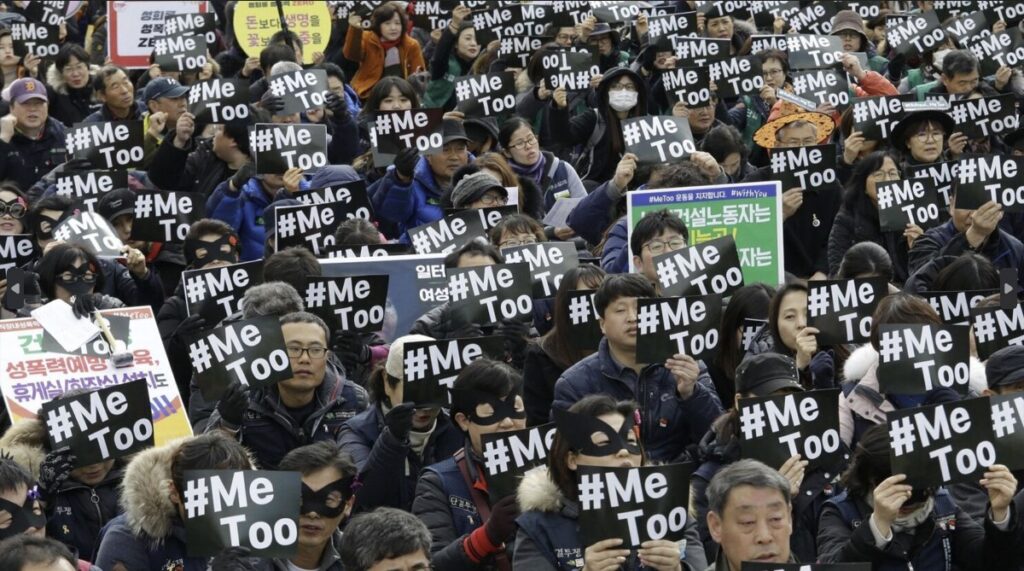
HJ: Yeah. I wanted to move out of my parents’ house. You can imagine that, many women choose that. So I got married as soon as I graduated from university. From the beginning of our marriage, we had to live with his parents for 10 years in the same house. He became even more silent. He didn’t care about the house chores. And was listless and angry at the same time. Regardless, I did my best for our marriage. I gave birth to two sons and raised the children while I continued to work hard and also took good care of his parents. On the other hand, you know, many Korean men also didn’t talk a lot because they didn’t have any good role models from when they were boys. He didn’t not speak even 10 words with his father in a year. I think my father-in-law drank every day and cursed when a smart female politician appeared on the news. My mother-in-law strongly believed that all women must silently endure their pain for peace in the family. You know, that’s a fake peace. It’s not peace. He left irritation and anger on me every day. Even though I made a living for the six of us, I was so tired and I had to walk on eggshells. I felt miserable and silently cried every day, every night. In the end, he left the country and we got divorced. And although I don’t have good feelings for him yet, I also pity him.
AA: So Harin, how did you find GERI?
HJ: I heard from Sarah, a friend of mine. She is one facilitator in South Africa. I gathered 10 people, five men and five women, including me for gender balance. After the book club, we had a lot of change for 10 people. Actually, except for me, four women have PhDs in Women’s Studies in Korea. There are two professors in universities as feminists. I think they were shocked and they cried every time more than me. But we are very scared because in Korea we have very strong gender conflict. Gender conflict is really bad in Korea. A few years ago, sexual harassment videos of a young girl under 18 were traded at high prices on telegram. Women were very angry. We had demonstrations in the streets every day. And the current president, who argued that men should play a more important role and has been elected, the budget for women’s politics has been cut. What terrible things to do.
So the book is like a revolution, I think. And after the book club, my official GERI workshop was the three-day workshop in Pokhara, Nepal in March, 2019. I was so exhausted as a counselor as well as a woman in Korea. I think I was so lonely. I had many friends in Korea, of course, but the women in Nepal were amazing and cared less about their body image, I think. Unlike Koreans who always, you know, suck their stomach in to look thin. Can you imagine that? We cannot breathe naturally.
Two months later in May, I attended my second workshop in UN Activities in New York. It was my first time in the US. I loved New York. It was a great city. Also experiencing other connections beyond race and nationality and skin color was very impressive to me, for example, seeing a masculine or tall American man tear up over his past sorrow truly moved me. I realized we are all the same: human, and we have lots of pain. But we focused on the difference, but we have to find the same needs as a human, like compassion, togetherness, understanding, love, and integrity. It was a great learning experience. The only regret was that I didn’t have enough time to see the Statue of Liberty.
AA: Haha. You’ll have to come back.
CB: All these different women and people have different stories to share. And one thing that people who identify as women often realize in our workshops is a level of pain and suffering that men go through that they weren’t aware of. Because men are told, boys are told to grow up, you know, toughen up, act like a man, even when they’re little kids. Even when they’re little boys! And so what you were describing about your ex-husband not saying but a few words, part of that’s his training. His training as boys and men throughout the world are being told this.
WK: Yeah. So maybe I’ll just jump in here a bit on that theme. One of the things that we’ve learned in doing this work for 30 years across so many cultures, there’s a couple of patterns that we’ve seen everywhere. One is that of course men know, conscious men know that women have certain suffering and disadvantages. Of course, they know that. But men discover the magnitude of the challenge of what it is to live as a woman in the world. They discover the magnitude of the pain and the constant threat of assault and belittling that women live with every day and every hour. And we often hear from the men, “I had no clue. I had no clue.” It’s amazing.
And I’ll give you one example. We did a workshop, another one of those UN workshops, I think it was the second one that we did. There was a man there who was seasoned, mature, late fifties or early sixties. He’d been doing men’s work for over 20 years. He was just flabbergasted by the stories that emerged from the women. And he went home to his wife and he said to her, he’d been married 30 years, and he told her these stories and he said, “I just have to say I am so grateful that you never had to go through these things, these horrific stories that I heard.” And she just looked at him and said, “are you a crazy man?” And she told him things she had never told him in 30 years of marriage, and his jaw dropped and he came back to us a couple weeks later and told us this and how transformative that was in his own marriage. So that’s an example of what happens on the one side.
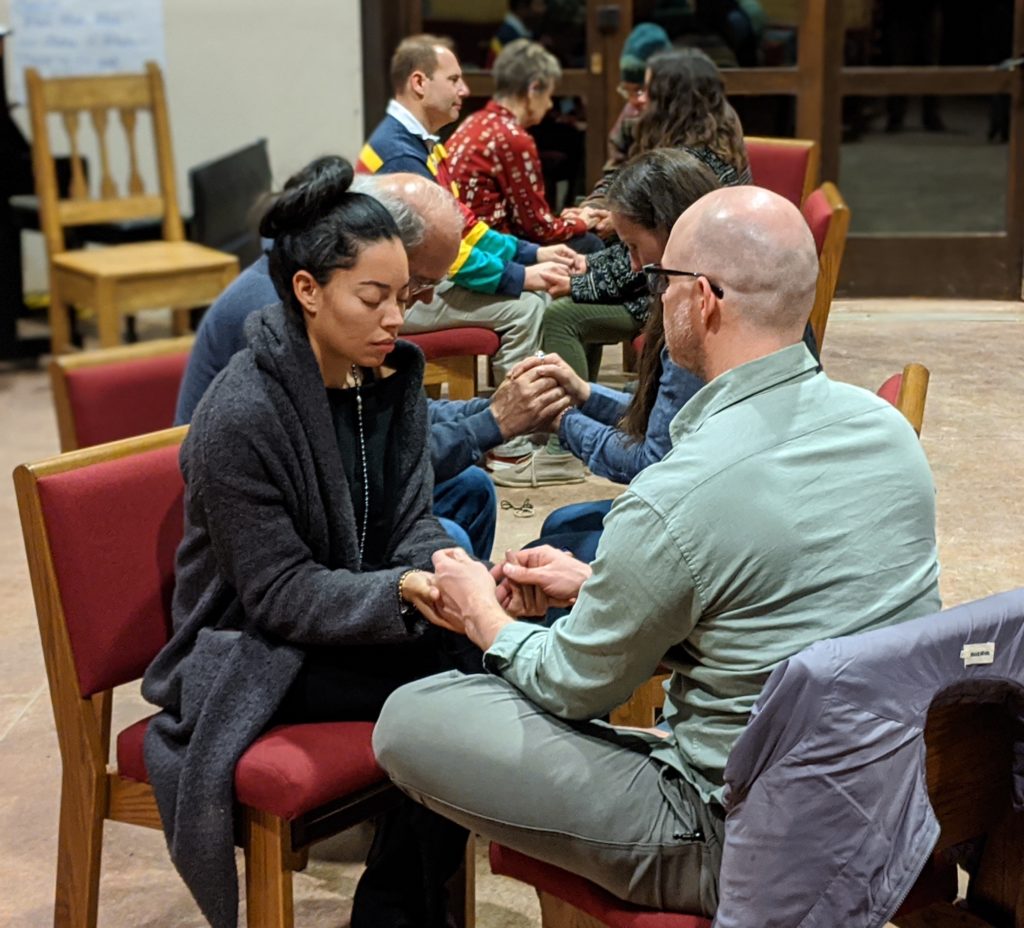
On the other side, what happens for women is that women normally and naturally and understandably assume that men have all the benefits. We have all the problems. So they’re fine and we’re not. And in fact, what happens is that women learn how much men suffer in this system. bell hooks puts it very beautifully. She says, “Men as young boys and men, they are required to self-mutilate a part of their humanity. And if they don’t do it to themselves, their peers do it to them.” And this is absolutely what happens when men are crammed into the man-box that says, “Thou shall not feel emotions. Thou shall not be anything like a girl.” All these restrictions, no feelings are allowed except anger. That one you can have, but none of the other feelings are allowed. These kinds of very powerful conditionings. And you are superior to girls, and girls are there for your pleasure and they’re there for your objectification.
I mean, I went through that training. Because in my youth, I was initiated into sexuality but I got no help from my parents. All I got from the school was plumbing biology, you know, sex education, how it works in terms of biology but nothing on intimacy, nothing on relationships. So where did I learn it? The only place all the rest of the boys learned it, from Playboy. From Penthouse. And those articles in Playboy Advisor basically trained you to be an objectifying little patriarchal– you know. And I was so fascinated to know, but that was my only source of information. And those articles train you to objectify, they train you to take apart the women’s bodies and compare this size to that size and this part to that part, so that by the time I became into my first sexual and love relationships when I was 18, all those images and all that conditioning was right there in bed with me. And I had no idea. It was all I knew. So I had drunk that in like it was nectar, not realizing it was poisoning my actual relationships with actual women.
And what we have learned from men, and this is so important, yes there are some very dark men out there, but the vast majority of men really don’t want this system. The vast majority of men would love an actual, respectful, co-collaborative and creative relationship with women. So what happens is that men discover the greatest male privilege is not any of the advantages they’re afforded to them in a patriarchal society, the greatest male privilege is to actively participate in deconstructing this unjust system and coming into equal and collaborative and creative and loving, compassionate partnership with women. And the same is true for heterosexuals and LGBTQ people. In our work, heterosexual people have no idea how much LGBTQ people suffer in heteronormative society. They just don’t, they just have no knowledge of it. And so when that level of truth telling comes out, there is this incredible realization that we are all suffering from this system that’s in different ways betraying us all.
And that’s the key insight or one of the key insights that then enables people to drop these veils. And what happens is the veils do drop and we see each other soul to soul, and we reclaim that magic communion of heart to heart and the natural radiance of every human being. Every human being is a gift to life. And these distinctions that we have made are so incredibly damaging and incredibly false. That is such a revelation that comes forward in our work.
AA: Oh, thank you. Thank you, all three of you for sharing those things. I have to say too, that that really did come through in the book. I think some of the scenes, the anecdotes and the visual images that I will always have with me that really stuck with me were with some of the workshops where, for example, there was one in Croatia where it was a silent witnessing exercise where they said, “If this has happened to you as a woman then stand up,” and the women would stand up and you watch the men, like you just described, Will, it dawns on them all that they’ve been through. And you read through that passage and as a woman it was very validating. But then they do the same thing for the men and the women sit there and witness these men stand up. Like, “If you have had to go to war and do things in war, have something happen to you as a soldier that was traumatizing to you.” And then these women are weeping for the suffering of their brothers, right? And it was incredibly moving that passage.
Or in a smaller group where a woman will share about her abuse and then a man shares about his abuse and then she’s comforting him. Oh my goodness, I was so moved. I was moved to tears so many times during the book. So again, I really, really recommend that listeners get this book. And then we’ll have all the information about the workshops on our website as well, so that listeners can get involved in a workshop and follow your work. Again, I respect and I’m so grateful for it. I’d love to hear any final thoughts from each of the three of you.
WK: I just want to say, and particularly what gives me hope, what holds the whole patriarchy system in place is untold truth. Untold stories keep oppression invisible. If we can find a skillful way to tell these stories and to be heard, which was the essence of the #MeToo movement, but to do that in communities, then the powers of truth and love naturally begin to crumble the entire dysfunctional system. We’ve seen this happen again and again. What Martin Luther King said at one point very beautifully, he said, “If we don’t balance our pessimism about human nature with an optimism about divine nature, we overlook the cure of grace. The cure of grace is the power of love to actually transform these conditions.”
And what we’ve experienced in this work time and time again is that even no matter how dark it gets and difficult, if we can hang in the process, there is an alchemical turn in which there is a light at the end of that tunnel. And the whole darkness transmutes into the beginning of healing and reconciliation. And the power of love is greater than that darkness. And when we speak those truths, it sets us free. And when we speak the deep truths, it sets us more deeply free. And that is based not on some theory, that is something we are living out in this work. And it’s such an incredible kind of reigniting of faith in the capacity of the human family to transform this structural injustice across all cultures and replace it genuinely with beloved community.
…the vast majority of men really don’t want this system. The vast majority of men would love an actual, respectful, co-collaborative and creative relationship with women.
CB: I’d like to just share what one of our friends and colleagues from South Africa, Dr. Pumla Gobodo-Madikizela said, that “what we most need now is to make public spaces intimate.” And that’s really powerful if you think about it. Wow. How would it be to sit at the table with your family, or maybe even your partner or your children, whoever it is, your friends, and just deepen the conversation around your gender experience, what’s happened to you in your life? We call that the gender river of life, one of our activities, just to share what has formed and shaped us around gender and sexuality. And I guarantee you, whenever any of the three of us go to a dinner party or meet someone new and they say, “What do you do for a living? What’s your passion?” And we say gender equity and reconciliation, that whole evening shifts. That’s all we’re doing.
AA: I bet.
WK: So sometimes when people ask me what I do, I say nonprofit management. No one has ever asked any more questions about that. They don’t care.
CB: But making public spaces intimate is what the task before us is. To really do that and hold each other with compassionate witnessing, with non-judgment, with care and tenderness for what we are going through or what we’ve gone through, and that will transform this world to really be in with each other with our story. And it’s not to wallow in our pain, but it’s to be in our pain long enough to work through it, move through it, to cut, to break the shackles that bind us. And to move beyond it so we can come into healthy relationships with one another together. Because most of us are carrying a bag of wounds on our back that haven’t been processed, haven’t been talked about, haven’t had any accountability, and then we just meet each other with those wounds. What a blessed life it would be if we could meet each other in love, truly in love and truly in the light, and see each other for the divine beings that we are. And that is what I experience in gender work. Even though we go into the fire and we sit in the fire and we transform by sitting in the fire and come out the other side as new beings.
HJ: Many people contact me and they want to share their experiences with me. It is so great. I regularly open an eight-week book club where I lead the book together. So far, 40 people of various occupations and ages have read the book together at the book club. Toward my hope, I plan to host an official GERI workshop in South Korea, and I’m trying to make GERI Workshop known to many schools and organizations, including the government. I wanted to convey into North Korea or Japan and China, neighboring countries. Someday I will introduce the workshop. Then maybe East Asia will be a much more peaceful and livable place to live together. So, yeah, that’s my hope. I just wanted to save and free the world. Even to just live as we are. That’s all. Thank you!
AA: Thank you. That’s so beautiful, Harin. Well, thank you again to all three of you, Harin Jeong, Will Keepin, and Cynthia Brix. Thank you again for your work and thanks so much for being here on the podcast today. I learned so much from you and enjoyed it tremendously. Thanks so much.
WK: And I have one last line from Gerda Lerner who wrote The Creation of Patriarchy, and I wanted to talk about that, but I’ll just summarize it this way. Patriarchy is a human invention. It had a beginning. It will have an end by human intervention, and that is the intention of our project, and it’s also the intention of your podcast. So we are united in that commitment. Thank you, Amy.
CB: Thank you, Amy.
HJ: Thank you.
The greatest male privilege is not any of the advantages in a patriarchal society,
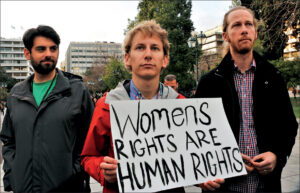
the greatest male privilege is to actively participate in deconstructing this unjust system.
Listen to the Episode
&
Share your Comments with us below!

